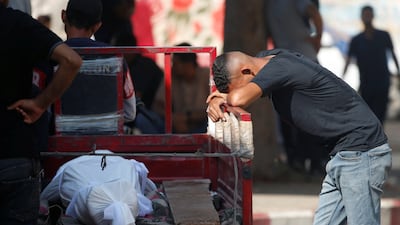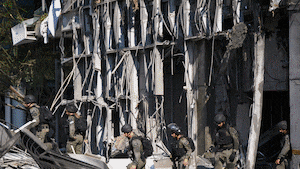At least 70 people were killed by Israeli gunfire and military strikes in Gaza on Thursday, the enclave's civil defence spokesman Mahmoud Basal said.
Medics earlier reported that 12 people had been killed while trying to approach an aid site operated by the US-backed Gaza Humanitarian Foundation in the central Gaza Strip.
The system has been described by a top UN official as “lame, medieval and lethal” following hundreds of deaths in similar incidents over the past few weeks.
Dozens of Palestinians were killed in separate Israeli air strikes in the northern Gaza Strip, medics added. One of those strikes killed at least 12 people, including women and children, near a mosque in the Shati refugee camp in Gaza city, they added.
Another eight civilians were killed in Israeli shelling of Gaza city on Thursday, Wafa news agency said. Five of those were killed in an attack on a house in the Zeitoun neighbourhood, and three others when an apartment in the west of the city was hit.
Israeli forces also blew up homes east of Jabalia Al Balad in northern Gaza, the agency reported.
There was no immediate comment from the Israeli army on Thursday's incidents. In recent days it said it was reviewing reports of civilian casualties.

About 100 other people were injured when Israeli drones and military vehicles opened fire in the morning near an aid distribution point in central Gaza, the official Palestinian news agency Wafa reported.
At least 338 people have been killed in total while gathering to collect aid from the Gaza Humanitarian Foundation (GHF), according to a tally released by local health authorities on Monday.
The recently created US and Israel-backed agency, whose four distribution centres are guarded by private security contractors and surrounded by Israeli forces, began operations in late May to supersede the aid delivery system operated by the UN. Israel said the move prevents the militant group Hamas from taking aid intended for civilians.
The centres are regularly overrun by Gazans desperate for food after a nearly three-month total blockade of aid deliveries imposed by Israel in March. Crowds start gathering near the distribution sites before dawn, despite a warning from the Israeli military that these areas are considered combat zones between 6pm and 6am.
"Palestinian lives have been so devalued. It is now the routine to shoot and kill desperate and starving people while they try to collect little food from a company made of mercenaries," Philippe Lazzarini, head of the UN agency for Palestinian refugees, UNRWA, said in a post on X after at least 14 people were killed while waiting for aid on Wednesday.
He described GHF as "a lame, medieval and lethal system that is deliberately harming people under the camouflage of 'humanitarian aid'".
Dozens killed waiting for aid in Khan Younis
"Hundreds of people have been reported killed since the 'Gaza Humiliation Foundation' started operating just over three weeks ago," he said, describing the group's operations as "a lame, medieval and lethal system that is deliberately harming people under the camouflage of 'humanitarian aid'".
He called for those responsible for establishing the new system to be held accountable, saying: "Inviting starving people to their death is a war crime."
The Palestinian death toll from Israel's war in Gaza passed 55,700 the health ministry said on Thursday and the number injured rose to more than 130,100. The ministry's figures do not distinguish between combatants and civilians, although it says the majority of victims have been women and children.
The war began on October 7, 2023, with a Hamas attack on southern Israel in which about 1,200 people, mostly civilians, were killed and about 250 taken hostage.


